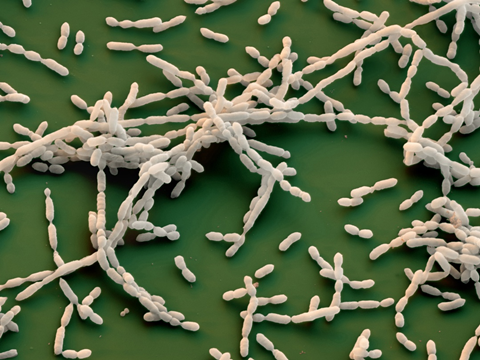
BASF has announced it is researching the bacterium Basfia succiniciproducens to transform sugar and carbon dioxide into fumaric acid - an intermediate for chemical production.
The research is being conducted in collaboration with Saarland University, University of Marburg and the University of Kaiserslautern-Landau in a joint research project, FUMBIO (FUMarsäure BIObasiert).
The bacterium, which was isolated in 2008 from the rumen of a Holstein cow, will reportedly be genetically modified by researchers so that it produces large quantities of bio-based fumaric acid, also known as fumarate, during fermentation. With this intermediate, BASF hopes to make a wide range of products with a low carbon footprint, including additives for food and animal feed, starting materials for medication, or building blocks for polymers, detergents and formulators.
BASF says the research project also focuses on the subsequent refinement of fumarate by enzymes – also known as bio-catalysis – into biodegradable industrial products. Fumaric acid is common in nature and is an intermediate product in many metabolic processes in humans, animals and plants.
In the chemical industry, it has traditionally been produced primarily from fossil-based raw materials, such as crude oil. The FUMBIO research project will measure the CO2 footprint of fumarate made with biotechnology methods and compare this to petrochemical-based production. The cooperation partners anticipate the carbon footprint will be significantly lower – or possibly negative – due to the use of CO2 as a raw material.
In addition to sugar, the CO2 that the bacteria will use as a source of carbon in the fermentation process will apparently come from exhaust gas streams at chemical production plants. “Carbon dioxide is an important raw material for us in the chemical industry,” says Dr. Barbara Navé, head of the FUMBIO project. “If we recycle CO2 from industrial off-gas, this will help us to reduce emissions of this greenhouse gas and achieve our climate targets by 2050,” Navé adds.
The companies also predict that biotechnology processes such as fermentation will become increasingly important for the chemical industry in the future. The FUMBIO project receives financial support from Germany’s Federal Ministry for Education and Research. In total, the Ministry is providing around €2.6 million to the project partners.
In similar news, Neste and South Korean chemical company Lotte Chemical have partnered to replace fossil resources with renewable raw materials in the manufacturing of chemicals and plastics. The collaboration aims to enable products and applications with a lower carbon footprint compared to those produced from fossil resources.
Investment company Taranis recently announced an investment of €10 million into cleantech company Pryme, which converts plastic waste into valuable products through pyrolysis technology. Taranis’ investment will enable Pryme to accelerate the roll-out of its technology to help reduce the amount of hard-to-recycle plastic being incinerated or ending up in the environment.
If you liked this story, you might also enjoy:
How are the top brands progressing on packaging sustainability?
The ultimate guide to global plastic sustainability regulation














No comments yet